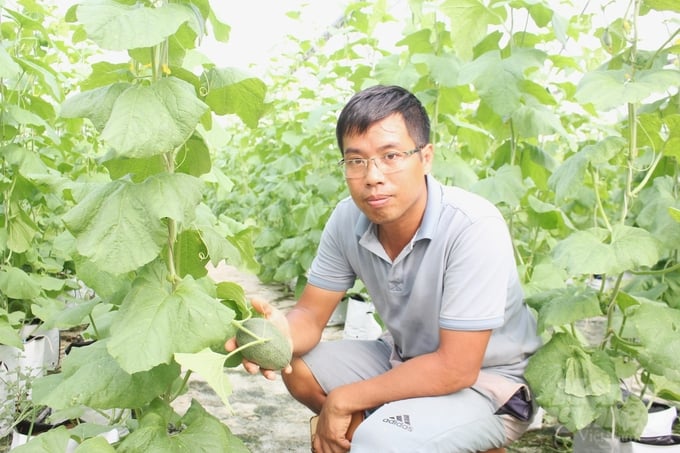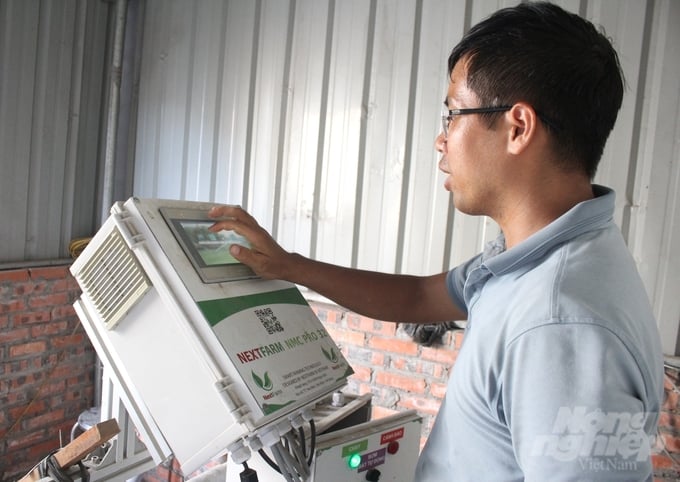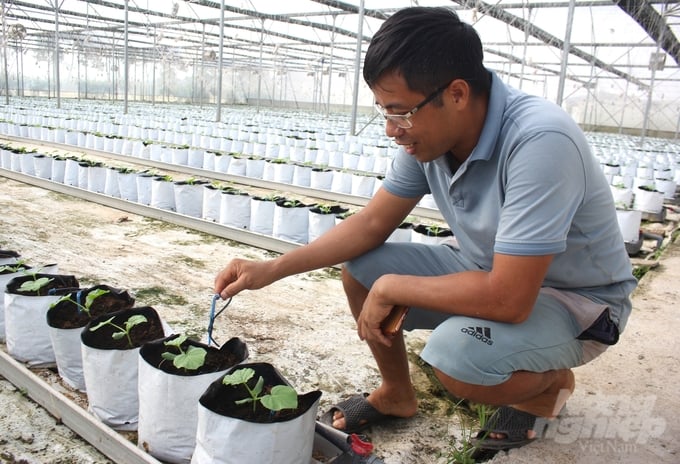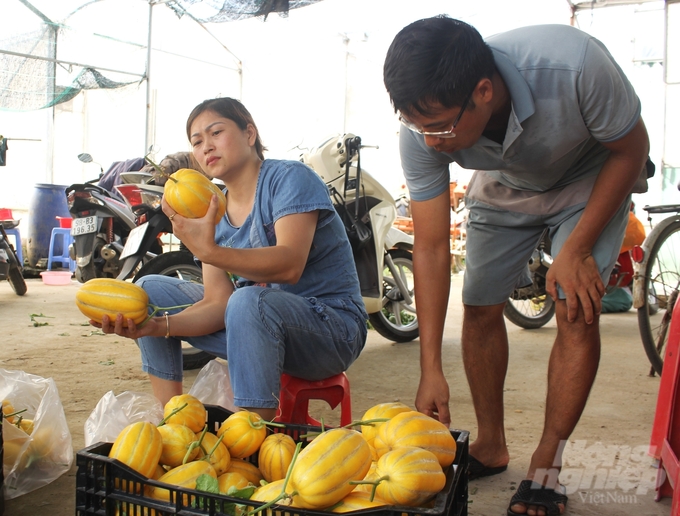November 27, 2025 | 23:46 GMT +7
November 27, 2025 | 23:46 GMT +7
Hotline: 0913.378.918
November 27, 2025 | 23:46 GMT +7
Hotline: 0913.378.918
Mr. Tran Xuan Dang, Director of Tri Yen High-tech Agricultural Cooperative (Duc Thanh village, Tri Yen commune, Yen Dung, Bac Giang) after graduating from Hanoi University of Science and Technology majoring in information technology, did not choose to join the profession. Being stuck with numbers and commands, he decided to leave the city and return to his hometown to do agricultural production, making his family and friends "fall back".

According to Mr. Dang, high-tech agricultural production has many advantages but also always has potential risks. Photo: Trung Quan.
Mr. Dang shared that although he studied engineering, his love for agriculture always burned deep within him. Whenever he returns to his hometown, he feels regretful because there is still much room for agricultural development in his homeland while the people are still struggling...
In 2017, he invested in building a net house system with an area of 2,500 square meters to grow leafy vegetables and melons. Lacking production experience, he looked to successful models to learn from experience and hired more experts in technical transfer.
In 2018, he applied innovative agricultural management software (operated by smartphone) to his farm. The results were surprising when this system helped him easily adjust the daily amount of water and fertilizer evenly for the plants. From there, much labor can be reduced, input materials saved, and balanced nutrition ensured for plant growth.

The smart agricultural management system helps Mr. Dang reduce labor, save on input materials, and ensure balanced nutrition for plants to grow. Photo: Trung Quan.
Currently, he still permits programmers to intervene in the farm's system to continue perfecting features towards watering according to the nutritional needs of crops instead of watering according to human-set norms.
Mr. Dang confided that high-tech agricultural production has many advantages but also has potential risks due to significant investment costs; cultivation techniques, nutrition, and pest management are high, while consumer markets and product prices are unstable...
Therefore, producers must both maximize the benefits of greenhouse systems (preventing negative impacts from weather and harmful pests from outside) and must keep abreast of changes in the garden. Because if you do not clearly understand what condition the plant is in, what nutrients need to be supplemented, how to prevent and treat diseases... to take timely treatment measures, it will undoubtedly fail.
"Don't think that holding a whole warehouse of technology will mean successful high-tech agricultural production. Modern machinery and equipment are just tools to help increase production efficiency. People are the ones who determine success or failure. Planting trees without understanding what the trees need is like driving blindfolded," Mr. Dang emphasized.

High-tech agricultural production has many advantages and potential risks due to significant investment costs and cultivation techniques... Photo: Trung Quan.
Also according to Mr. Dang, when farming in greenhouses or greenhouses, a factor that needs special attention is the soil. If the soil is not treated well, it will carry pathogens, lack nutrients, and cost money and labor to replace the soil.
Growers must always adhere to the principle that "how much nutrients are taken from the soil, the same amount must be replenished". When the soil is replenished with nutrients, the plants automatically grow healthily, and the costs of plant protection, fertilizer, and care also gradually decrease. At the same time, it facilitates continuous cropping to increase revenue.
Regarding plant disease prevention and treatment, in the immediate future, in addition to using pesticides according to the allowed list, at the right time, at the right time, and in the correct dosage, growers must regularly visit the fields to understand growth habits of each type of pest and disease. Besides, apply the principle of "controlling pests, not destroying them." Because if we try harder to use pesticides to kill them, it is easy to make pests and diseases resistant to them. It should be accepted that in the garden, about 10% of plants have diseases.

Good management of input factors helps Mr. Dang successfully intensively cultivate yellow muskmelon, continuously supplying products to the market. Photo: Trung Quan.
In the long term, using natural enemies will be the most effective way to prevent and treat harmful organisms. However, currently, the selling price of natural enemies is high, so many gardeners who want to use them are still unable to do so.
Mr. Dang said that the cooperative's production area has expanded to more than 3 hectares (including 1.5 hectares of membrane houses and net houses). In particular, good management of input factors helps the cooperative have favorable crop conditions, even intensive cultivation of yellow pear melon continuously in an area while still providing high yield and quality. On average, the combined produces three melon crops yearly with an output of 7-8 tons/crop. Thanks to that, continuous products are supplied to the market, increasing income.
Translated by Tuan Huy
/2025/11/27/3830-1-152901_403.jpg)
(VAN) Dong Nai is developing its key crop areas, expanding planting area codes, and applying high technology to increase the value of agricultural products, aiming at a green and sustainable agriculture.

(VAN) Tay Ninh’s livestock sector is undergoing a major transformation, applying high-tech, closed-loop circular models to build sustainable value chains.
/2025/11/26/3627-4-082628_818.jpg)
(VAN) From a small café on the red basalt highlands, Le Van Hoang started a business with clean coffee, building Enjoi Coffee into a symbol of organic agriculture in the Lam Dong plateau.
/2025/11/25/0045-1-135246_13.jpg)
(VAN) Ca Mau is researching a model of sea-encroaching embankments combined with viaducts and logistics service zones, aiming both to prevent erosion and create land funds for marine economic development.

(VAN) The information was shared at the seminar 'Urban Agriculture - Solutions for Developing Green Spaces,' organized by the Kinh te & Do thi Newspaper and the Biotechnology Center of Ho Chi Minh City.
/2025/11/19/4141-2-132831_216.jpg)
(VAN) One of Japfa's outstanding solutions is implementing digital transformation and artificial intelligence (AI) to optimize operations, enhance productivity, and advance sustainable development.
/2025/11/19/4847-1-093540_448.jpg)
(VAN) The Gia Lai Provincial People’s Committee had a working session with the delegation of the U.S. Department of Agriculture, the State of Idaho, and representatives of the State's leading enterprises.